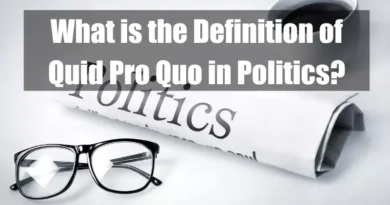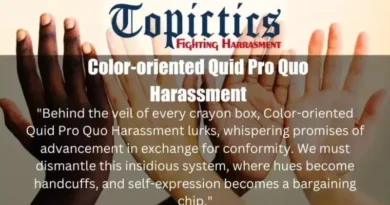Are Quid Pro Quo and Bribery The Same?
Takeaways
| Key Points |
|---|
| Quid pro quo and bribery are distinct, though closely related, with quid pro quo referring to a reciprocal exchange and bribery involving corrupt intent. |
| Quid pro quo becomes bribery when it is aimed at corruptly influencing an official or violating ethical duties. |
| Bribery is characterized by an illegal quid pro quo, where the intent is to corrupt or improperly sway an official’s actions for personal gain. |
| While quid pro quo can be part of bribery, it is not always illegal and is common in many legitimate transactions; intent is key in distinguishing between the two. |
Introduction
Quid pro quo and bribery are not the same, although they share similarities. Quid pro quo, a Latin term meaning “something for something,” refers to an exchange of favors where both parties mutually benefit. This can be legal and is common in various situations, like job negotiations or deals between organizations. However, bribery involves offering or receiving something of value to influence the actions of someone in a public or legal role, which is a criminal offense. Essentially, while all bribery involves quid pro quo (an exchange), not all quid pro quo is bribery. The key distinction lies in whether the exchange is done to corrupt a public or legal duty, which makes it bribery and illegal in most contexts.
To better understand the distinction, it’s crucial to break down their meanings, legal frameworks, and how they operate in various contexts.
What Is Quid Pro Quo?

“Quid pro quo” is a Latin phrase meaning “something for something.” It refers to an exchange where one party provides something of value in return for a favor or action from another party. This can happen in many legitimate transactions. For example, buying a product in a store is a form of quid pro quo—you give money and receive goods. Quid pro quo can be perfectly legal as long as both parties participate in a legitimate exchange without deceit or coercion.
However, quid pro quo becomes problematic when used in certain contexts, particularly in public office or official matters, as it could potentially lead to corruption. When this exchange involves influencing official acts in return for personal gain, it might cross into bribery or corruption.
Defining Bribery

Bribery occurs when someone offers, gives, receives, or solicits something of value with the intent to influence the actions of a public official or another person in a position of authority. The intent is usually to sway the official to take a particular action, such as awarding a contract or passing legislation, which they would not have done otherwise. Bribery involves corrupt intent, which means there is a clear expectation that the recipient will act in a way that benefits the briber.
In legal terms, bribery is defined by three key elements:
- Offering or promising something of value.
- An intent to influence an official action.
- The official act being influenced is tied to the public official’s duties (in the case of public bribery) or in violation of their fiduciary duty (in private bribery).
Bribery is illegal under federal law, such as the U.S. Code 18 Section 201, and can carry severe penalties, including imprisonment, hefty fines, and disqualification from public office.
Is All Quid Pro Quo Bribery?
While quid pro quo is a necessary element of bribery, not all quid pro quo arrangements are illegal. For example, in a typical business deal, one party offers payment, and the other party provides services or products—this is a quid pro quo, but it is legal because it is a voluntary transaction without corrupt intent.
However, when a quid pro quo involves an exchange that aims to corrupt the integrity of an official action, it becomes bribery. For example, offering money to a government official in exchange for a construction contract is a clear case of bribery because the official’s duties are being compromised for personal gain.
Thus, the distinction lies in intent. In a simple quid pro quo, both parties exchange something of value without any illegal or corrupt motivations. Bribery, conversely, involves the intent to improperly influence someone’s decisions in a position of authority, typically for personal gain.
Legal Examples
A famous case that illustrates the concept of bribery involved former Illinois Governor Rod Blagojevich. Blagojevich attempted to sell a U.S. Senate seat in exchange for personal favors and financial gain. This clear quid pro quo was not just an unethical exchange but also illegal bribery under U.S. law. The transaction had a corrupt intent—he was trying to profit personally by leveraging his position of power.

On the other hand, legitimate quid pro quo exchanges occur regularly in contractual agreements. For example, paying a lawyer for legal services is quid pro quo, but it’s not bribery because both parties are engaging in a lawful and voluntary exchange without any corrupt intent.
Quid Pro Quo in Gratuities and Favors
In legal contexts, there is also a difference between bribery and illegal gratuities. Gratuities are a type of “reward” offered after an official act has taken place, rather than beforehand, and are considered less serious than bribery. However, they are still illegal in many circumstances, especially when given to influence future actions or as a reward for favorable treatment. For instance, giving a gift to a public official after they have helped you secure a government contract may not be classified as bribery but could still be prosecuted as an illegal gratuity under certain statutes.
In such cases, quid pro quo exists, but the timing and nature of the exchange can determine the legal consequences.
Bribery in Different Contexts
Bribery isn’t limited to the public sector. It can also occur in private businesses, known as commercial bribery. This might involve a company offering payments or gifts to a competitor’s employee to sway decisions about pricing, products, or contracts. This type of bribery undermines fair competition and is similarly illegal.
In contrast, quid pro quo occurs in numerous private settings where it’s perfectly legal. For example, an employer offering a bonus for high performance is a form of quid pro quo that benefits both the company and the employee. It’s legal because it doesn’t involve any unlawful or corrupt action.

Bribery vs. Extortion
Extortion is another crime that can sometimes be confused with bribery. However, extortion involves obtaining something of value through coercion, threats, or intimidation rather than offering something voluntarily in return for an action. While bribery involves a willing exchange where the official has the option to decline, extortion places the recipient under pressure to comply out of fear.
Although both bribery and extortion involve corrupt exchanges, the methods used are different. Bribery focuses on voluntary cooperation with corrupt intent, while extortion involves forced compliance through threats.
Key Differences Between Bribery and Quid Pro Quo
- Intent: Quid pro quo becomes illegal when there’s an intention to corruptly influence official actions, making it bribery. Without corrupt intent, quid pro quo remains legal in most settings.
- Legal Outcome: Bribery is always illegal because it involves an attempt to influence someone improperly. Quid pro quo is not necessarily illegal and is often part of regular, lawful business exchanges.
- Public vs. Private Context: Bribery often involves public officials or individuals in positions of authority, while quid pro quo can happen in any private or public transaction, with the legal implications depending on the nature of the exchange.
Conclusion
In summary, quid pro quo and bribery are not the same, though they are closely related. Quid pro quo becomes bribery when the exchange is aimed at corruptly influencing an official or violating ethical duties. Bribery, by definition, involves an illegal quid pro quo, where the intent is to corrupt or sway an official’s actions for personal gain. While quid pro quo is part of bribery, it is not always illegal and is a common part of many legitimate transactions. Understanding the legal distinctions is key, as the difference often lies in the intent behind the exchange and the parties involved.
FAQ
What is the legal definition of “quid pro quo”?
Quid pro quo” is a Latin term meaning “something for something.” In legal contexts, it refers to an agreement where one party provides something of value to another in exchange for a specific action or benefit. In corruption cases, it implies a direct exchange: an official act in return for a personal benefit.
How is “bribery” defined under federal law?
Bribery involves the offering, giving, receiving, or soliciting of something of value to influence the actions of an official in the discharge of their public or legal duties. Under 18 U.S.C. § 201(b), bribery requires a quid pro quo arrangement, meaning there must be a specific intent to give or receive something of value in exchange for an official act.
Are all quid pro quo arrangements considered bribery?
No, not all quid pro quo arrangements constitute bribery. For an arrangement to be deemed bribery, it must involve a corrupt intent to influence an official act. Legitimate transactions, such as contractual agreements where goods or services are exchanged for payment, are also forms of quid pro quo but are legal and do not involve corrupt intent.
What constitutes an “official act” in bribery cases?
An “official act” is defined as a decision or action on a question, matter, cause, suit, proceeding, or controversy that may be pending or brought before a public official. In McDonnell v. United States, the Supreme Court clarified that setting up meetings, calling other officials, or hosting events do not qualify as official acts unless they are directly linked to a formal exercise of governmental power.
How did the McDonnell v. United States case impact the interpretation of bribery laws?
The 2016 Supreme Court decision in McDonnell v. United States narrowed the definition of “official act” in federal bribery statutes. The Court held that routine political activities, such as arranging meetings or hosting events, do not constitute official acts unless they involve a formal exercise of governmental power. This ruling made it more challenging for prosecutors to prove bribery, as they must now demonstrate a direct connection between the benefit received and a specific official action.
What is the difference between a bribe and a gratuity?
A bribe involves a quid pro quo arrangement where something of value is given in exchange for an official act. Conversely, a gratuity is a reward given for an official act that has already been performed without a prior agreement. In Snyder v. United States, the Supreme Court held that 18 U.S.C. § 666 criminalizes bribes but does not extend to after-the-fact gratuities, meaning officials cannot be federally prosecuted under this statute for accepting gratuities for past actions.
Can implicit agreements constitute bribery?
Yes, implicit agreements can constitute bribery. An explicit agreement is not always necessary; a mutual understanding between the parties that an official act will be exchanged for something of value can be sufficient. However, proving an implicit quid pro quo can be challenging and often relies on circumstantial evidence.
How does the concept of “corrupt intent” factor into bribery cases?
“Corrupt intent” refers to the deliberate intention to engage in wrongful, dishonest, or fraudulent conduct. In bribery cases, prosecutors must prove that the defendant acted with corrupt intent, meaning they knowingly and willfully engaged in a quid pro quo arrangement to influence an official act.
Are campaign contributions considered bribery?
Campaign contributions can be considered bribery if there is evidence of a quid pro quo arrangement, where the contribution is made in exchange for a specific official act. Absent such an agreement, campaign contributions are generally legal and protected under the First Amendment. The distinction hinges on whether there is a direct exchange of the contribution for official action.
How do courts distinguish between legal lobbying and illegal bribery?
Legal lobbying involves advocating for specific policies or actions without offering something of value in exchange for an official act. Illegal bribery, however, entails providing something of value with the corrupt intent to influence an official act. The key distinction is the presence of a quid pro quo arrangement in bribery cases.
What role does the timing of the benefit play in determining bribery?
The timing of the benefit can be crucial in determining bribery. If something of value is given before an official act with the intent to influence that act, it is more likely to be considered bribery. Benefits given after an official act may be considered gratuities, which, depending on the jurisdiction and specific laws, may not be criminalized in the same way as bribes.
Can a public official be charged with bribery for actions taken after leaving office?
Yes, a public official can be charged with bribery for actions taken after leaving office if the bribery arrangement was made while they were still in office. The critical factor is whether the quid pro quo agreement occurred during their tenure as a public official.
How does the Snyder v. United States decision affect the prosecution of gratuities?
In Snyder v. United States (2024), the Supreme Court ruled that 18 U.S.C. § 666 criminalizes bribes to state and local officials but does not extend to after-the-fact gratuities. This means that while offering or accepting something of value intending to influence an official act constitutes bribery, providing or receiving a reward after an official act, without a prior quid pro quo agreement, is not criminalized under this statute. This decision narrows the scope of prosecutable offenses under federal bribery laws.
What is the significance of the term “something of value” in bribery statutes?
The term “something of value” in bribery statutes is interpreted broadly to include not only monetary payments but also goods, services, favors, or any other benefits that the recipient considers valuable. This broad interpretation ensures that various forms of inducements intended to influence official actions are encompassed within bribery prohibitions.
How do courts assess the evidence to establish a quid pro quo in bribery cases?
Courts assess evidence of a quid pro quo in bribery cases by examining the context and circumstances surrounding the alleged exchange. This includes evaluating communications between the parties, the timing of the benefit relative to the official act, and any patterns of behavior that suggest a mutual understanding. Direct evidence, such as explicit agreements, is rare; therefore, courts often rely on circumstantial evidence to infer the existence of a quid pro quo arrangement.
Can a public official be charged with bribery if they did not complete the promised official act?
Yes, a public official can be charged with bribery even if the promised official act was not completed. The crime of bribery focuses on the agreement and intent to exchange something of value for an official act. Therefore, the offense is complete once there is a corrupt agreement, regardless of whether the official act occurs.
How does the “stream of benefits” concept apply in bribery cases?
The “stream of benefits” theory in bribery cases refers to situations where a public official receives ongoing benefits from a benefactor in exchange for a series of official acts. Instead of a single quid pro quo transaction, there is an understanding that the continuous provision of benefits will influence the official. This theory allows prosecutors to establish bribery without linking each benefit to a specific official act, focusing instead on the overall corrupt relationship.
Are there defenses available to individuals accused of bribery?
Yes, individuals accused of bribery may assert several defenses, including:
- Lack of Corrupt Intent: Arguing that there was no intent to influence or be influenced in the performance of an official act.
- Absence of Quid Pro Quo: Claiming there was no agreement to exchange something of value for an official act.
- Entrapment: Asserting that law enforcement induced the defendant to commit an offense they would not have otherwise committed.
- Duress: Maintaining that the defendant was coerced into participating in the bribery under threat of harm.
The applicability and success of these defenses depend on each case’s specific facts and circumstances.
How do state bribery laws differ from federal bribery laws?
State bribery laws vary but generally parallel federal statutes in prohibiting the exchange of something of value for official acts. However, the definitions of key terms, the scope of prohibited conduct, and the penalties can differ significantly between jurisdictions. Some states may have broader or narrower interpretations of what constitutes an “official act” or “thing of value,” and the procedures for prosecuting bribery can vary. It’s essential to consult the specific laws of the relevant state to understand the applicable legal standards.
What are the potential penalties for a federal bribery conviction?
Under 18 U.S.C. § 201, penalties for federal bribery convictions can include:
- Imprisonment: Up to 15 years.
- Fines: Up to three times the monetary equivalent of the thing of value involved in the offense.
- Disqualification: Permanent prohibition from holding any office of honor, trust, or profit under the United States.
These penalties reflect the severity with which federal law treats the corruption of public officials.









